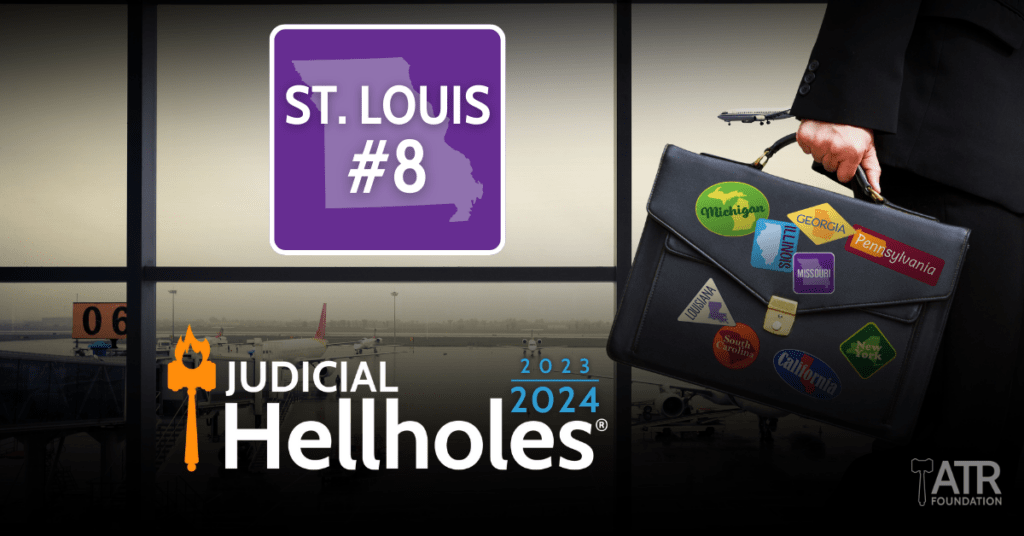‘Highly Unusual’ Rehearing of Louisiana Case Raises Judicial Independence Concerns
Louisiana Supreme Court Waffles Under Political Pressure, ATRA Brief Urges Court to Stand Strong

St. Louis’ Legal Woes Exposed as Trial Lawyer Contributions Stall Reform
St. Louis once again captures national attention, securing the No. 8 Judicial Hellholes® spot in the American Tort Reform Foundation’s 2023-2024 report.
In 2023, St. Louis faced a convergence of judicial challenges that thrust it into the spotlight. Allowing the admission of junk science, surging “nuclear” verdicts, an international reputation as a plaintiff-friendly jurisdiction, plus legislative gridlock thanks to the influence of the trial bar, combine to underscore an urgent need for reform.
Junk science infiltrates St. Louis courtrooms due to lax “gatekeeping” by judges. Questionable scientific evidence, often unproven, is presented before juries, risking unjust decisions. St. Louis is central to thousands of lawsuits against Monsanto over Roundup® weedkiller. Recent cases showcase the introduction of dubious “experts,” casting doubt on the credibility of scientific evidence.
“Judges must fulfill their duties as gatekeepers and ensure that only generally accepted science is presented to juries in order to protect the integrity of the court system,” Tiger Joyce, American Tort Reform Association president said.
Lawsuit abuse and excessive tort costs annually erode billions from Missouri’s economy. St. Louis residents pay nearly $1,608 each year in a “tort tax,” hampering the city’s economic potential. Statewide, Missouri residents’ annual “tort tax” nears $1,000, while nearly 58,000 jobs are lost each year due to excessive tort costs.
Trials in St. Louis increasingly result in “nuclear” verdicts exceeding $10 million. ATRF spotlights the “anchoring” tactic as a contributing factor to the increase in nuclear verdicts. Trial lawyers will suggest exorbitant awards, which become an “anchor” point in juries’ minds. Missouri law permits plaintiffs’ lawyers to urge juries to return a specific amount to compensate a person for his or her pain and suffering and other subjective noneconomic damages.
“These massive payouts are a significant burden on the state’s economy and increase costs for everyone,” Joyce said.
St. Louis also gained global notoriety as a plaintiff-friendly jurisdiction this year, which could have far-reaching impacts on legitimate international activities, according to ATRF. A case before the U.S. Court of Appeals for the 8th Circuit could have monumental implications, potentially holding U.S. companies liable for foreign injuries.
ATRF also points the sway of trial lawyers amid Missouri’s legislative gridlock, with some lawmakers appearing influenced by substantial campaign contributions.
“The trial bar’s significant financial backing raises concerns about its impact on legislative decisions, putting the integrity of the legislative process at stake,” Joyce said.
Notably, state Sen. Mike Moon, R-Ashgrove, is seeking re-election and has accepted nearly $25,000 in campaign contributions from the trial bar. Similarly, state Sen. Bill Eigel, R-Weldon Spring, is vying for the Republican gubernatorial nomination and has accepted nearly $33,000 in trial bar donations across his campaigns.
“Despite these challenges, hope for reform persists,” Joyce said. “The imperative now is for lawmakers, judges, and citizens to collaborate in addressing these issues head-on.”
Emphasizing the principle of equal access to justice, St. Louis’s No. 8 ranking in the Judicial Hellholes® report is a clarion call for reform.
“Missourians must unite in advocating for legal reform to spur economic growth, support small businesses, and restore faith in the legal system,” Joyce said.
For a comprehensive understanding of the challenges faced and to read the full section on St. Louis in this year’s report, visit JudicialHellholes.org.
Louisiana Supreme Court Waffles Under Political Pressure, ATRA Brief Urges Court to Stand Strong
Left unchecked, these jurisdictions will continue dragging down economic growth and undermining justice through rampant lawsuit abuse.
Claimants Given Opportunity to Vote on Plan; Judge to Reconsider Scientific Validity of Plaintiffs’ Experts
Legitimate consumer protection demands sound science and impartial analysis — not distorted data designed to manufacture lawsuits.
Law Firms Spent $168M+ on 2.2M Ads in Georgia
ATRA’s Latest Studies Reveal Financial Influence and Lack of Transparency in Pennsylvania’s Campaign Finance Systems